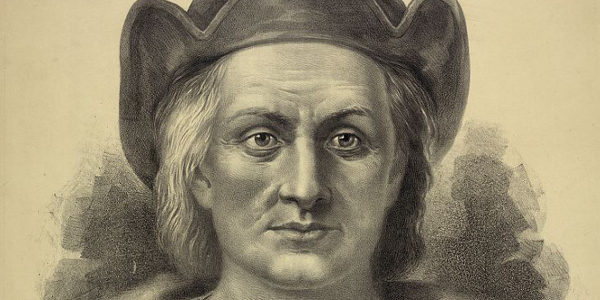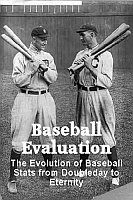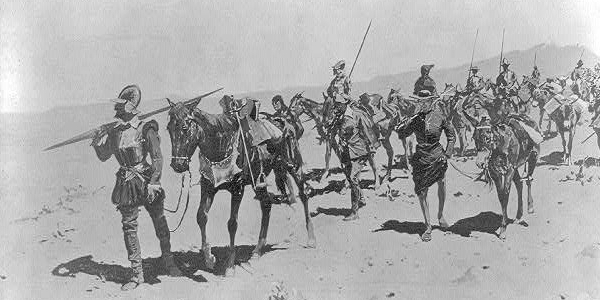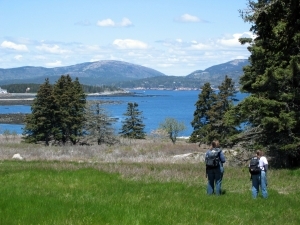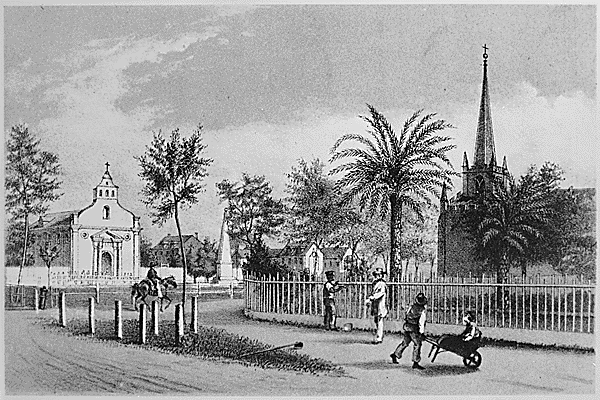Sponsor this page. Your banner or text ad can fill the space above.
Click here to Sponsor the page and how to reserve your ad.
-
Timeline
Detail - 1502
May 11, 1502 - Christopher Columbus left Spain on his fourth voyage to the New World, landing back on the islands of Martinique and Jamaica in June. This voyage would take him to Central America, but not to North America.
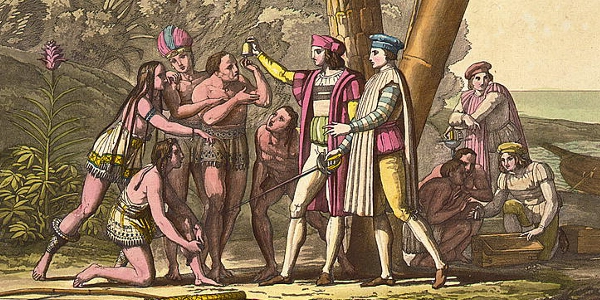
After the difficulty and imprisonment of his Third Voyage, Christopher Columbus was no longer governor of the Spanish colony, but had been released by King Ferdinand and effectively absolved from his crimes. Columbus wanted to return; the King agreed, funding a Fourth Voyage. The Admiral would now return with knowledge of two facts; the Portuguese with Vasco de Gama had found the East Indies by sailing east around Africa and he would not be welcome in the land that he had once governed.
However, Columbus had strict orders from the King and Queen. His mission was to find a path to India, the Maluku Islands of Indonesia, the Spice Islands, by sailing west, through the hoped for straits of Central America, and to circumnavigate the world. He was not supposed to visit Hispaniola at all. With one hundred and forty-seven men, Columbus left Santa Catalina, Spain on May 11, 1502. He was accompanied by his son Fernando, thirteen years old, and captained four ships; Capitana, Gallega, Vizcaina, and the Santiago de Palos. On June 29, 1502, Columbus disobeyed the King's orders, attempting to port in Santo Domingo, Hispaniola, prompted by an anticipated hurricane. He was denied entry; the governor did not believe him, having sent a homeward bound fleet of treasure ships back to Spain at the same time against the advice of the Admiral. Twenty of those ships were lost at sea.
Columbus arrived off the coast of today's Honduras on July 30, 1502. He reached the San Juan River in Nicaragua by September 17. Over two and one half months, the ships of the fourth voyage plied the coast from Honduras to Panama, looking for passage. He was often told of the riches of gold by the natives. The tribes of the region of Panama also told Columbus that another ocean was only a few days march west, convincing Columbus that he was near the Orient. At the head of the Belen River, a garrison was established at the beginning of 1503. It was attacked through the spring until Columbus decided to return to Hispaniola in April, but was beached in Jamaica by June. Columbus wrote a letter from Jamaica back to the King of Spain on July 3, 1503, about the same time as he decided to send a canoe to Hispaniola for a ship to rescue them. Two canoes were dispatched, but upon arrival, current Governor Nicolas de Ovando y Caceres refused. For one year, Columbus and his remaining men were stranded with a mutiny engaged, then defeated. Finally, on June 29, 1504 (Fernando dates leaving the island as June 28), a rescue caravel, purchased by Diego Mendez (a member of the canoe party) with the Admiral's money, from Hispaniola arrived. At the time, there were one hundred and ten men left of the Fourth Voyage.
Columbus returned to Spain, leaving Hispaniola on September 11, 1504, and arriving on November 7, 1504.
Below are three excerpts about the fourth voyage by Ferdinand Columbus, the Admiral's son. These passages, predominantly transposed with the punctuation used at the time, indicate much about the goals and privations of the trip. They also, in many ways, modify the perceptions of the legacy of Columbus. While neither exempting or glorifying these adventures, the words of one passenger, albeit his son, do assist in explaining what went on. Use your own judgement to what that means, in both negative and positive tones.
Arrival in Hispaniola, June 29, 1502
From the "The Life and Times of Christopher Columbus by His Son," Ferdinand Columbus.
The Knight Commander of Lares, governor of the island, who
had been sent by the Catholic Sovereigns to hold an inquest into
Bobadilla's administration, took no notice of our unexpected arrival on Wednesday, June 29th Havmg come to off the harbor, the Admiral sent Captain Pedro de Terreros, captain of one of the ships, to explain to the Knight Commander that because he had to replace one of his ships and also because he expected a great storm, he wished to take shelter in port The Admiral also advised him not to permit the homeward-bound fleet to sail for eight days because of the great danger The Knight Commander, however, would not permit the Admiral to enter the port, much less would he detain the fleet that was homeward bound for Castile This fleet, consisting of twenty-eight ships, earned the Knight Commander Bobaddilla, who had made prisoners the Admiral and his brothers, Francisco Roldan, and all the other rebels who had done the Admiral so much hurt God was pleased to close the eyes and minds of all those men so that they did not heed the Admirals good advice. I am certain that this was Divine Providence, for had they arrived in Castile, they would never have been punished as their crimes deserved, on the contrary, as protege of Bishop Fonseca, they would have received many favors and thanks But their departure from that port for Castile prevented this On reaching the eastern end of Espaniola the storm assailed them with such fury that the flagship carrying Bobadilla and most of the rebels went down, and it did such havoc among the rest that only three or four out of the
twenty-eight weathered the tempest.
This happened on Thursday, the last day of June, and the Admiral bemg forbidden the harbor, anchored as close as he could
under the land in order to save himself This caused much grief
and chagrin to the ships' crews, who on account of being with the Admiral were denied the hospitality that should be accorded to foreigners, and all the more to men of the same nation, they also feared that if some disaster should befall, they could expect no aid from ashore Inwardly the Admiral felt the same grief and bitterness, especially when he reflected that m a time of mortal danger he was being demed refuge in the land that he had given to Spain for its honor and exaltation.
By his skill and good judgment he managed to keep the fleet
together till the next day, when, as the storm gained in intensity and night came on with deep darkness, three ships were torn from their anchorages, each going its own way, and though all ran the same danger, each thought the others had gone down The worst sufferers were the men on the Santo, who to save their boat, in which Captain Teneros had gone ashore, dragged it astern by cables, until they were forced to cut it loose in order to save themselves.
Buy Chronology

Searching for the Strait, July-August, 1502
From the "The Life and Times of Christopher Columbus by His Son," Ferdinand Columbus.
The find of that canoe and its contents made the Admiral aware
of the great wealth, civilization, and industry of the peoples of the western part of New Spain Reflecting, however, that as these lands were to the leeward, he could sail thither from Cuba whenever he wished, he decided to continue with his search for a strait across the mainland that would Open a way to the South Sea and the Lands of Spices. So, like one groping in the darkness, he sailed eastward toward Veragua and Nombre de Dios, believing the strait must be there, and so it was But his mistake consisted in conceiving it to be a channel running from sea to sea instead of a neck of land or isthmus, as others did. This error may have arisen from a misunderstanding, for being told the strait was in Veragua and Nombre de Dios, and the word "strait" meaning either a land or water strait, he understood it in the latter sense, as the most common and as signifying what he fervently sought for. Be that as it may, that land strait proved to be the doorway through which Spain entered upon the dominion of many seas, and one by means of which great treasure has been discovered and conveyed to Spain. So It was through the finding of that canoe that the existence of New Spain was first made known, for God was pleased that this great end should be achieved in that way and no other.
As there was nothing of importance in those Guanaja Islands,
he did not tarry there but made for a point of the mainland that
he called Caxinas Point, from the name of a tree that grew there, this tree produces fruit resembhng wrinkled ohves with a spongy core that are good to eat, especially when cooked, the Indians of Espaniola call these fruit "caxmas" As this country contained nothing worthy of mention, the Admiral lost no time in exploring a large bay that he found there but held on his course eastward along the coast that runs to Cape Gracias a Dios, this coast is very low and open all the way. The Indians in the vicinity of Point Caxmas were dressed like those in the canoe, in dyed shirts and breechclouts, they also had thick quilted cotton jerkins like breastplates that were sufficient protection against their darts and even withstood some blows from our swords. But the people who live farther east, as far as Cape Gracias a Dios, are almost black in color, ugly in aspect, wear no clothes, and are very wild in all respects. According to the Indian who was our prisoner they eat human flesh and raw fish, and pierce holes m their ears large enough to insert hen's eggs, that is why the Admiral named that country Costa de las Orejas.
On Sunday morning, August 14, 1502, accompamed by the captains and many of the fleet's people, the Adelantado went ashore
with his banners displayed to hear Mass The Wednesday following, when boats were sent ashore to take formal possession of the
land in the name of the Catholic Sovereigns, more than a hundred
Indians bearing food came down to the shore, as soon as the boats had beached they presented these gifts to the Adelantado and went some distance off without saying a word. The Adelantado ordered them repaid with hawk's bells, beads, and other trifles He also asked them about the resources of the region by signs and with the aid of the Indian interpreter But this interpreter, having been but a short time with us, did not imderstand the Christians because of the distance - short though it is - separating his country from Espanola, where many of the ship's people had learned the Indians' language, nor did he understand the Indians of that locality These Indians being pleased with what had been given them, next day more than two hundred others came to the same spot bringing food of various kinds. chickens that were better-tastmg than ours, geese, roast fish, red and white beans resembling kidney beans, and other commodities like those of Espanola The land though flat was verdant and lovely, with many pines and evergreen oaks, myrobalans of the kind called hobos in Espanola, and
almost aU the other frmts and foods found in Espanola There were
also many pumas, stags, and roe deer, and many of the fish found
in Espanola but not in Spam.
Stranded in Jamaica, 1503
From the "The Life and Times of Christopher Columbus by His Son," Ferdinand Columbus.
Monday, May 1, 1503, we stood to the northward with winds
and currents easterly, always endeavoring to sail as close to the wind as possible All the pilots insisted that we had passed eastward of the Canbbee Islands, but the Admiral feared he would
not be able to fetch Espanola So it turned out, because Wednesday, May 10th, we sighted two very small low islands full of turtles (as was all the sea thereabout, so that it seemed to be full of little rocks), that is why these islands were called Las Tortugas. Passing northward by them, we arrived on Friday afternoon at the Jardin de la Rema, which is a great number of small islands on the south side of Cuba.
As we lay here at anchor, ten leagues from Cuba, suffering greatly from hunger because we had nothmg to eat but biscuit and a little oil and vinegar, and exhausted by working three pumps day and night to keep the vessels afloat (for they were ready to sink from the multitude of holes made by the shipworm), there came on at night a great storm in which the Bermuda, being unable to ride It out, fouled us and broke our stem, nor did she get off whole, but smashed her stem almost to the helm With great labor on account of the heavy rain and high wind, by God's favor the ships got clear of each other, and although we let go all the cables and anchors we had, none held but the ship's sheet anchor. The next morning we found intact but one strand of her cable, which must have parted if the night had lasted one hour longer, and since that place was full of rocks we could not have avoided running on some of those astern of us But it pleased God to deliver us then as He had delivered us from many other dangers.
Departing from there with much labor, we put in an Indian village on the coast of Cuba, called Macaca, and having obtained
some refreshment there, we stood over toward Jamaica because the
easterly winds and the strong westward-running currents would
have never let us make Espanola - especially since the ships were so riddled by the shipworm that day and mght we never ceased workmg three pumps in each of them, and if any broke down, we had to supply its place while it was being patched up. For all our efforts, the eve of St John's Day the water in our ship rose so high that it was almost up to the deck With great toil we continued in this state until daybreak when we made a harbor in Jamaica named Puerto Bueno. This harbor was well protected but had no source of fresh water, nor was there any Indian village in the vicinity. So, keepmg afloat as well as we could, the next day we sailed eastward to another harbor, named Santa Glona, that was enclosed with reefs Having got in, since were no longer able to keep the ships afloat, we ran them ashore as far as we could, grounding them close together board and board, and shoring them up on both sides so they could not budge, and the ships bemg in this position the tide rose almost to the decks Upon these and the fore and stemcastles we built cabins where the people could lodge, making our position as strong as possible so the Indians could do us no harm, for at that time the island was not yet inhabited or subdued by the Christians.
When we were thus fortified in the ships as strong as we could
be, a crossbow shot from land, the Indians of that country, who
proved to be kind and gentle people, presently came in canoes to
barter their wares and provisions for our truck That the trade
might be on an equal basis and neither side gain more than was
just, the Admiral placed two men in charge of the traffic, and it was agreed that whatever the ship's people obtamed by trade would be divided among all inshares By that time we had nothing aboard to eat, for we had aheady consumed the greater part of our provisions, much had spoiled, and as much again had been lost in the haste and disorder of the embarkation from Belen.
We being in such straits, God was pleased to bring us to an island abounding in eatables and densely inhabited by Indians eager to trade with us, so that they came from all directions For this reason, and that his people might not disperse throughout the island, the Admiral preferred to fortify himself aboard and not ashore Our people bemg by nature disrespectful, no punishment or order could have stopped them from running about the country and into the Indians' huts to steal what they found and commit outrages on their wives and children, whence would have arisen disputes and quarrels that would have made enemies of them, and if we had taken then food from them by force, we would later have suffered great need and privations But this did not happen, for the men were confined in the ships and no one could go ashore without gettmg permission and signing out. The Indians were so grateful for this that they freely brought all we needed in exchange for our things For one or two hutias we gave them a lacepomt, for a large cake of cassava bread, which is made from grated roots, we gave two or three strmgs of green or yellow beads, and for a large quantity of anythmg a hawk's bell, with an occasional gift of a mirror, red cap, or a pair of scissors to the caciques or nobility to keep them happy By these means we were assured of a plentiful supply of provisions, and the Indians were glad to have us as neighbors.
As some means had to he found of returrung to Castile, the Admiral held several meetmgs of his captains and other leadmg men to discuss how this might be done It was idle to hope that some ship might come that way, and there was no possibility of building a new vessel, for we had neither the implements nor the artisans needed for the task, unless we allowed ourselves a long time - and even then such a makeshift vessel would not do, considering the westward-running winds and currents among those islands, so it would only be a loss of time and cause our total rum instead of averting it.
After many conferences the Admiral determmed to send messengers to Espanola with the news that he was marooned on Jamaica and the request that a rescue ship laden with provisions and
ammunition be sent to him For this mission he chose two reliable
and courageous men Certainly courage was required to make that
crossing in the only way it could be done, that is, in Indian canoes made by hollowmg out a large log, when heavily loaded, these dugouts are three fourths under water Moreover, the crossing had to be made in medium-sized canoes, for the smaller ones were too dangerous and thee larger ones too slow and cumbrous for such a long voyage.
In July, 1503, having found two suitable canoes, the Admiral
ordered Diego Mendez de Segura, chief clerk of the fleet, to sail in one, and Bartolomeo Fieschi, a Genoese gentleman, to sail in the other, each takmg a crew of six Christians and ten Indian paddlers. On reaching Espanola, Diego Mendez should proceed to Santo Dommgo, and Fieschi should return to Jamaica with news of Mendez's safe arrival in order to spare us worry and fear that he might have perished This could easily happen with such flimsy craft if the sea turned at all rough, Indians do not run such great risk, for they can right a capsized canoe while swimming in the sea and get back in. However, honor and necessity incite men to face the greatest risks, so Mendez and Fieschi set out down the coast of Jamaica toward the east end of the island, which the Indians call Aomaqmque after the cacique of that province, this end was thirty-three leagues from Maima, the place where we had beached our ships. The distance from Jamaica to Espanola being thirty leagues, with only one little island or rock along the whole course, and that some eight leagues from Espanola, they had to wait for a perfect caln before startmg to cross that great space in such frail craft By God's favor this calm soon came.
Image above: Landing of Columbus showing objects to Natives, 1860/1880. Courtesy Library of Congress. Below: Christopher Columbus, 1892, Currier and Ives. Courtesy Library of Congress. Info source: "The Life and Times of Christopher Columbus by His Son," Ferdinand Columbus. Courtesy archive.org; christopher-columbus.eu; "Letter of Columbus on the Fourth Journey," 1503, Christopher Columbus, American Journeys Collection, Wisconsin Historical Society; Wikipedia Commons.
